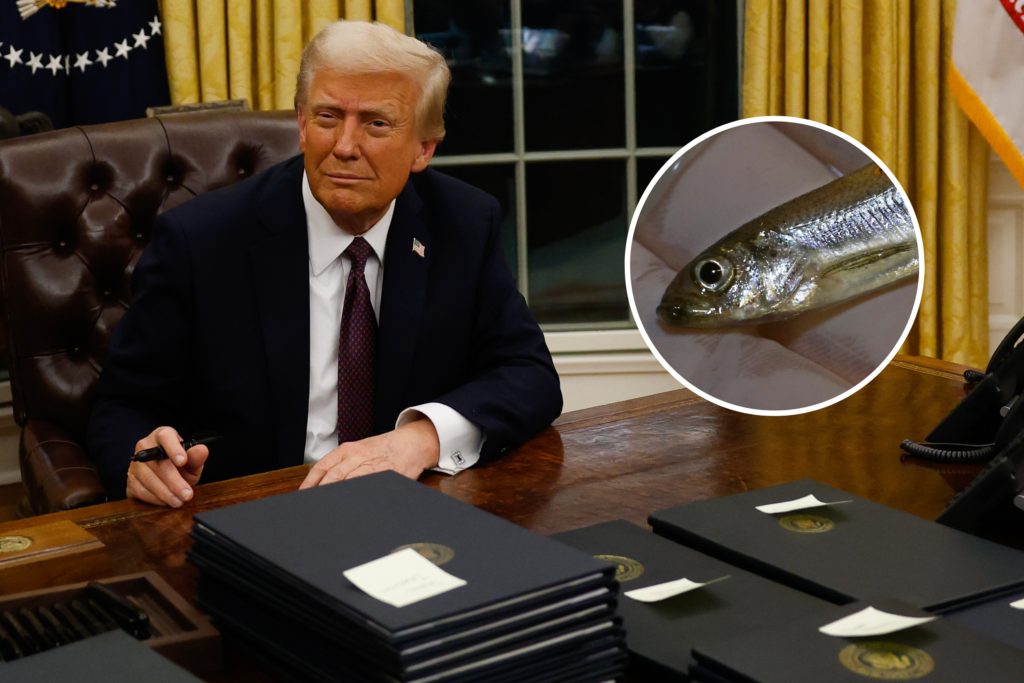Food & Climate
US President Donald Trump has been hostile to the Delta smelt since the Los Angeles wildfires, using it as a political card against Democrats. He has cited efforts to save the 3-inch-long creature from extinction as one of the main reasons for the failure to control the fires, but experts have accused him of trying to destroy the environment in favor of agricultural projects.
As more than 60 square miles Los Angeles violently burned earlier this month. Trump implied in a Truth Social post that Los Angeles lacked the water to put out the fires because Gov. Gavin Newsom chose to protect an “essentially worthless fish called a smelt,” which is only found in Northern California.
Trump took more shots at California in his inauguration speech, saying the Los Angeles wildfires were still burning “without even a token of defense.” Later that day, he signed an executive action titled “putting people over fish,” ordering a re-routing of the state’s complex water system, according to a report seen by “Food & Climate” platform.
Newsom and California are frequently the target of Trump’s ire. Some of his most memorable criticisms of the state have been over how it manages its wildlands in the face of wildfire risk. In his first term, Trump suggested California should be “raking” their forests to clean up dead brush and trees.
More than sharp political rhetoric
The jabs are more than sharp political rhetoric — they could have real consequences for disaster aid.
As Trump blamed Newsom and smelt for Los Angeles wildfires, House Speaker Mike Johnson and other Republican lawmakers suggested there should be conditions attached to aid with respect to “water resource mismanagement” and “forest management mistakes”, according to “CNN“.
In reality, California’s Delta smelt has minimal connection to the city’s water supply, say experts, who argue the US president’s willingness to condemn an endangered species reflects the chaotic and shortsighted nature of his environmental policies.
“It’s scapegoating an internal enemy that’s supposed to be responsible for all our problems, in this case, fires and drought — and directing everybody’s anger toward that,” John Buse, general counsel for the Center for Biological Diversity, told AFP.
It is a “classic authoritarian” move, he argues — and a likely harbinger of what we will see under Trump 2.0.

Trump’s assertion, first made on Truth Social, claimed that Governor Gavin Newsom’s failure to sign an order allowing millions of gallons of water from excess rain and snowmelt to flow southward from the state’s north had hampered firefighting efforts.
Fire hydrants ran dry, while firefighters are making intensive efforts to extinguish the Los Angeles wildfires.
California has a complex water crisis — with climate change an outsized factor.
But the Delta smelt — a small, translucent fish considered a “sentinel” species that indicates the health of its Sacramento–San Joaquin Delta habitat — is not a culprit.
Water diversions for agriculture and urban use
“It was once one of the most abundant fish in the upper estuary, supporting a diverse array of predators including striped bass,” said Peter Moyle, a University of California, Davis ichthyologist widely regarded as the leading expert on the species.
However, habitat degradation caused by water diversions for agriculture and urban use, competition and predation by invasive species, exposure to contaminants, and dwindling food sources led to the Delta smelt being listed as “threatened” in 1993, and “endangered” by California in 2009.
Water projects in The Golden State must balance conservation with meeting agricultural and urban demands.
Trump’s rhetoric has nationalized what was previously a Californian political narrative pitting fish against farmers, leaving the Delta smelt a convenient “scape fish,” according to Moyle.
Massive federal- and state-run pumping stations redirect water from northern areas to the south, creating challenges for the smelt and other aquatic life.
Increased salinity from these pumping operations harms the fish, and many are killed when they are sucked into screens or diverted into canals.
Despite Trump’s claims, however, protections that limit the amount of pumping for the Delta smelt and other fish have had minimal recent impact on the Los Angeles water supply.
The federal Central Valley Project, which Trump has targeted under his order, primarily serves agriculture in Central California — not Los Angeles, explains Buse.
While the State Water Project does supply water to Southern California, including Los Angeles, most of the state’s major reservoirs are currently at or above historic levels for this time of year, particularly in the south, official data shows.
Even in drier years, protections for the Delta smelt account for only a small fraction of reductions in outflow.

The primary factor determining water pumped downstream is the amount of rainfall and snowmelt flowing into the San Francisco estuary.
As Moyle explained in a 2017 paper, the same saltwater that harms the fish also poses significant challenges for agriculture, making it the key driver of restrictions on water exports.
Rather than addressing the root causes of California’s water challenges — including climate change — Trump’s rhetoric turns “hardships associated with environmental destabilization into partisan gotchas,” said Caleb Scoville, a sociologist at Tufts University.
“It feeds us-versus-them identity politics but doesn’t actually hold power to account.”

